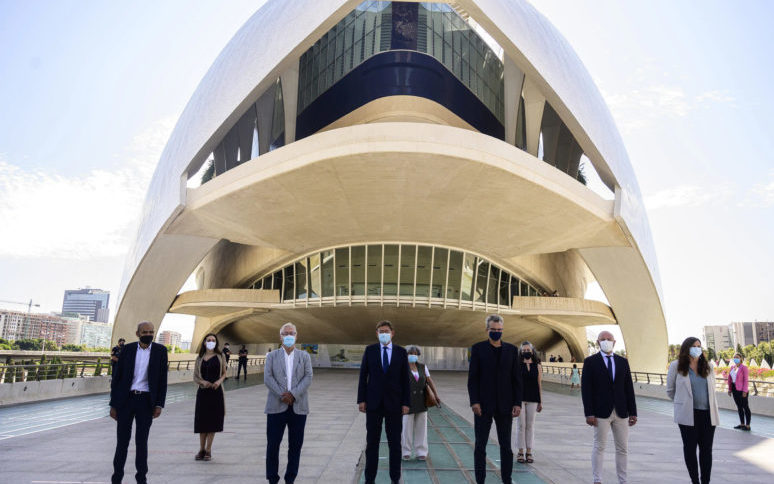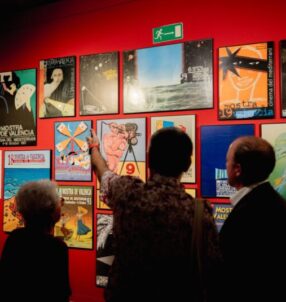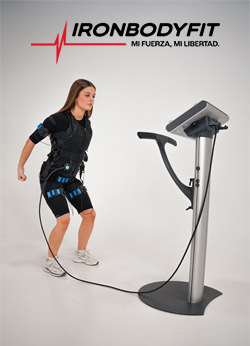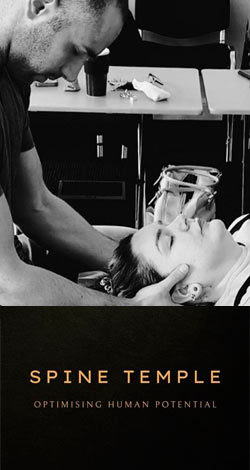#After many years of hope, the 36th celebration of the Goya Awards will be held in Valencia at the ‘Palau de Les Arts’ on February 12. A “reunion of cinema with the public”, the ceremony will also close the ‘Berlanga Year’ centenary commemorations of filmmaker Luis García Berlanga.
This year’s gala will not only be a long-awaited reunification with a live audience of 1600 people, but will also have a “new model”, according to Film Academy president Mariano Barroso. We can expect musical performances, the participation of Valencian filmmakers, and “moments to remember”. Rather than individual or pairs of presenters, beloved and well-known figures who represent different types of cinema will host the gala. The Palau de Les Artes will also play a leading role, alongside the prominence of Berlanga in the celebrations.
Luis García Berlanga, an honorary father of the institution and respected filmmaker of classics such as ‘Welcome Mr. Marshall!’ will have a tribute that is central to the awards this year. This film finale follows the ‘Berlanga Year’, and is a culmination of the exhibitions, screenings, conferences and more that have been hosted in Valencia to honour the filmmaker in his birthplace.
One prominent part of the ‘Berlanga Year’ will be the exhibition ‘Berlanguiano’, previously in the headquarters of the Royal Academy of Fine Arts of San Fernando in Madrid, which will arrive in Valencia during the week of the Goyas. Hosted by Bombas Gens, this homage exhibition from February 8-12, will contain photographs, scripts, posters, and audio-visual elements.
“The ‘Berlanga Year’ deserved a cinematic finale, and this could not be other than the celebration of the Goya Awards in our city, which every day becomes more and more a benchmark of culture, modernity and diversity,” said the mayor of Valencia, Joan Ribó.
President of the Generalitat, Ximo Puig said that this celebration of the Goya Awards “puts us on the side of hope and is a milestone in the emotional recovery we need. It is more than a gala; it is a support to the Spanish film industry and its resurgence.”
And what better city to represent this resurgence than Valencia, which has attracted over 1000 recent film shootings due to the tireless work of the VLC film office. President of Diputació de València, Toni Gaspar emphasised that the institutions “must encourage and help an industry that not only generates jobs, but has the wonderful ability to influence people.”
You only need to look as far as Berlanga himself to see the far-reaching influence of film. Berlanga’s influence will extend even further to the promenade leading to the Hemifèsric, which will be renamed in his honour.
Of course, we cannot forget the awards themselves. Fernando León de Aranoa’s ‘El buen patrón’ has overtaken 1994’s ‘Días contados’ to become the most nominated film in Goya history, holding 20 nominations in total including ‘Best Film’. Close behind, is ‘Maixabel’ by Icíar Bollaín, with 14 nominations. With a celebrated cast of actresses such as Penélope Cruz, Milena Smit, and Aitana Sánchez-Gijón, Pedro Almodóvar’s newest work ‘Parallel Mothers’ also has an impressive eight nominations.
As put by Barroso, after so much time apart, this year’s ceremony will be “a space to meet again, both with the spectator and with all those who are part of the Spanish film family”.
Report by Julia McGee-Russell
Article copyright Julia McGee-Russell / ‘24/7 Valencia’
Nominations for the Goya Awards:
BEST FILM
“El buen patrón”
“Libertad” by Clara Roquet
“Madres paralelas”
“Maixabel”
“Mediterráneo”
BEST LEADING ACTOR
Javier Bardem in “El buen patrón”
Javier Gutiérrez in “La hija”
Luis Tosar in “Maixabel”
Eduard Fernández in “Mediterráneo”
BEST LEADING ACTRESS
Emma Suarez in “Josefina”
Petra Martínez in “La vida era eso”
Penélope Cruz in “Madres paralelas”
Blanca Portillo in “Maixabel”
BEST SUPPORTING ACTOR
Celso Bugallo in “El buen patrón”
Fernando Albizu in “El buen patrón”
Manolo Solo in “El buen patrón”
Urko Olazábal in “Maixabel”
BEST SUPPORTING ACTRESS
Sonia Almarcha for “El buen patrón”
Nora Navas for “Libertad” de Clara Roquet
Aitana Sánchez-Gijón for “Madres paralelas”
Milena Smit for “Madres paralelas”
BEST DIRECTOR
Fernando León de Aranoa for “El buen patrón”
Manuel Martín Cuenca for “La hija”
Pedro Almodóvar for “Madres paralelas”
Iciar Bollaín for “Maixabel”
BEST NEW ACTOR
Óscar de la Fuente in “El buen patrón”
Tarik Rmili in “El buen patrón”
Chechu Salgado in “Las leyes de la frontera”
Jorge Motos in “Lucas”
BEST NEW ACTRESS
Ángela Cervantes in “Chavalas”
Almudena Amor in “El buen patrón”
Nicolle García in “Libertad”, by Clara Roquet
María Cerezuela in “Maixabel”
BEST NEW DIRECTOR
Carol Rodríguez Colás for “Chavalas”
Javier Marco for “Josefina”
David Martín de los Santos for “La vida era eso”
Clara Roquet for “Libertad”
BEST ORIGINAL SCREENPLAY
Fernando León de Aranoa for “El buen patrón”
Clara Roquet for “Libertad”
Iciar Bollaín, Isa Campo for “Maixabel”
Juanjo Giménez Peña, Pere Altamira for “Tres”
BEST ADAPTED SCREENPLAY
Júlia de Paz Solvas, Núria Dunjó López for “Ama”
Agustí Villaronga for “El vientre del mar”
Daniel Monzón y Jorge Guerricaechevarría for “Las leyes de la frontera”
Benito Zambrano y Cristina Campos for “Pan de limón con semillas de amapola”
BEST ANIMATED FILM
“Gora automatikoa”
“Mironins”
“Salvar el árbol (Zutik!)”
“Valentina”
BEST DOCUMENTARY
“El retorno: La vida después del ISIS”
“Héroes, silencio y rock and roll”
“Quién lo impide”
“Un blues para Teherán”
BEST IBEROAMERICAN FILM
“Canción sin nombre” by Melina León (Peru)
“La cordillera de los sueños” by Patricia Guzmán (Chile)
“Las siamesas” by Paula Hernández (Argentina)
“Los lobos” by Samuel Kishi (Mexico)
BEST EUROPEAN FILM
“Adiós, idiotas” (France)
“El hombre perfecto” (Germany)
“Otra ronda” (Denmark)
“Una joven prometedora” (UK)
BEST ORIGINAL SONG
“Burst Out” – Composers: Àngel Leiro, Jean-Paul Dupeyron, Xavier Capellas for “Álbum de posguerra”
“Que me busquen por dentro” – Composers: Antonio Orozco, Jordi Colell Pinillos for “El cover”
“Las leyes de la frontera” – Composers: Alejandro García Rodríguez, Antonio Molinero León, Daniel Escortell Blandino, José Manuel Cabrera Escot, Miguel García Cantero for “Las leyes de la frontera”
“Te espera el mar” – Composers: Maria José Llergo, for “Mediterráneo”
BEST ORIGINAL SCORE
Zeltia Montes, for “El buen patrón”
Fatima Al Qadiri, for “La abuela”
Alberto Iglesias, for “Maixabel”
Arnau Bataller, for “Mediterráneo”
BEST FICTIONAL SHORT FILM
“Farrucas”
“Mindanao”
“Totem Loba”
“Votamos”
“Yalla”
BEST DOCUMENTARY SHORT FILM
“Dajla: Cine y olvido”
“Figurante”
“Mamá”
“Ulises”
BEST ANIMATED SHORT FILM
“Nacer”
“Proceso de selección”
“The Monkey”
“Umbrellas”
BEST CINEMATOGRAPHY
“El buen patrón”
“Libertad”
“Madres paralelas”
“Mediterráneo”
BEST SOUND
“El buen patrón”
“Madres paralelas”
“Maixabel”
“Tres”
BEST EDITING
“Bajocero”
“El buen patrón”
“Josefina”
“Maixabel”
BEST SPECIAL EFFECTS
“El buen patrón”
“La abuela”
“Mediterráneo”
“Way Down”
BEST ART DIRECTION
“El buen patrón”
“Las leyes de la frontera”
“Madres paralelas”
“Maixabel”
BEST COSTUME DESIGN
“El amor en su lugar”
“El buen patrón”
“Las leyes de la frontera”
“Maixabel”
BEST MAKEUP AND HAIRSTYLES
“El buen patrón”
“Las leyes de la frontera”
“Libertad”
“Maixabel”
BEST PRODUCTION SUPERVISION
“El amor en su lugar”
“El buen patrón”
“Maixabel”
“Mediterráneo”
Related Post
This site uses Akismet to reduce spam. Learn how your comment data is processed.


























Leave a comment